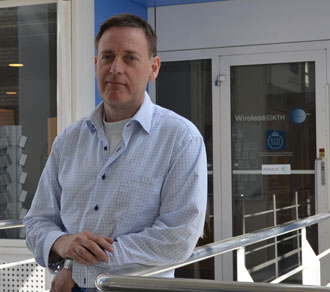New Associate Professor: Jan Markendahl
Published Jun 05, 2012
Jan Markendahl came to KTH from the industry nine years ago to work as a project manager within the research at Wireless@KTH. He thrived in the academic world and therefore chose to stay and take a doctoral degree in order to make it through the academy. Since 1st of June 2012 he is now Associate Professor in Wireless Infrastructure Deployment and Economics.

– I had no academic ambitions from the beginning but I have always found it easy to write and I liked to write articles. Since I worked in EU and Vinnova projects our work was also supposed to be published, says Jan Markendahl.
To be able to move on in academia, a doctoral degree was needed and when Jan was offered by Professor Jens Zander, to become his PhD student, he accepted the offer. The interdisciplinary dissertation called “Mobile Operators and Cooperation” was presented in February 2011.
A year later, KTH called for an associate professor in Jan Markendahl's research area and as of June 1, 2012 he is Associate Professor in Wireless Infrastructure Deployment and Economics. Since his research field is totally new at KTH, he needs to create both a research- and an education function within the area. Jan Markendahl has for over two years been responsible for a newly developed course called Wireless Infrastructure Deployment and Economics. The students who take the course are studying technology within an economic context. The course is open for graduate students but especially for Master students. – We discuss how wireless networks are used, how the telecom market looks like, what operators and other players are doing and how to dimension and build mobile networks, he says. Besides teaching, he will supervise Master theses and also recruit a number of PhD students and postdocs.
Jan Markendahl says that he will organize his research into three smaller areas. One area is about designing mobile broadband networks and to include economic aspects into the analysis. There will be a mix between technology and economy. A lot of focus will be on the deployment of indoor networks and business aspects that need to be taken into consideration, for example, contracts with hotels or conference centers.
– In this field, we will announce for a PhD student already in June, says Jan Markendahl.
The second area is mobile payments services and business models. – As for mobile payments we are working together with Stockholm School of Economics and the School of Industrial Engineering and Management at KTH. We also have partners in the industry, such as different public transportation companies like SL, SJ, UL and Samtrafiken, says Jan Markendahl.
The third area is Internet of Things, focusing on machine to machine communication (M2M), where Jan Markendahl also cooperates with Stockholm School of Economics and The Foundation Marketing Technology Center, MTC.
– There it is about machines and gadgets that communicate with each other instead of humans, he says.
His goal is to hire one graduate student and one postdoctoral researcher in each one of these three areas.
Jan Markendahl thinks it is challenging to guide young master- and graduate students. - Most of them have gone to school all their life and a lot of things regarding systems, markets and business are new to them. Therefore, it is often difficult for them to put things into an overall context and you have to explain how it all fits together, he says.
Another challenge arises in the combination of technology and economics that his research is built upon. – The research at Stockholm School of Economics is mostly about finding out how things and business are working. They look at what has happened and what they can learn from the history. Their researchers know a lot about how and why markets and businesses are organized the way they are, but they seldom use their knowledge to improve any solutions or systems. But I can see in my research, that one can use insights on business related issues to create better solutions, says Jan Markendahl.
Regarding for example mobile payments or the development of mobile broadband, it brings a challenge as the development is going on right now. – Economic research usually is retrospective and show why things have happened. But mobile payments, allocation of new spectrum, the development of 4G networks is happening here and now. And to do business research, combined with technical research while all this is happening feels very new but it is also very fun, says Jan Markendahl.

